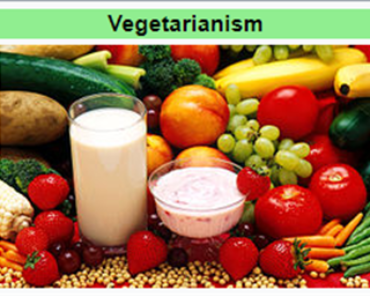The Pros And Cons of a Vegetarian Diet
The vegetarian diet is the healthiest diet with respect to receiving direct benefits nutritionally and calorically. Needless to say, following a vegetarian diet has more pros associated with it than it has cons.
Almost 16 million Americans (5% of the population) are vegetarian and 50% of them are vegan (Harris Interactive study commissioned by the Vegetarian Resource Group). The number of vegetarians in the United States has doubled since 2009 when the count was only 2.5%.
Data also shows that 33% of Americans are eating vegetarian meals more often, even though they are not fully committed to the lifestyle.
What is the appeal of a meat free diet and are there any pitfalls? Read on to learn the answers to these questions.
The Pros of Vegetarianism 
Eat Generous Portions of Healthy and Nutritious Foods
If you look at a vegetarian food pyramid, you won’t deprive yourself, as there is a broad grouping of foods that are featured on the triangular grid. At the base of the 3D structure, whole grains, bread, cereal, pasta, and rice are listed for consumption.
Nutritionists recommend that vegetarians eat completely grains liberally, enjoying as much as 6 to 11 servings for the day. Vegetables are given the thumbs up as well, with recommended servings set at three a day. Two to four servings of fruit are advised for daily consumption too.
Low-fat and non-fat dairy products for lacto-ovo vegetarians are listed at the upper tier of the pyramid. Eat a moderate amount of yogurt, cheese, and low-fat and non-fat milk, or two to three servings per day.
Sitting on the same tier with the dairy products is the listing for legumes, nuts, and seeds. You can eat a moderate amount of 2 to 3 servings per day. At the very top of the triangle, vegetable oils and fats are listed. Consume such plant-based oils as olive oil and soy oil sparingly.
A Quick Summation of the Primary Benefits
If you want to take quick overview of the “pros” associated with vegetarian living, then the following listing can provide you with some enlightenment in this respect.
“Pros” Associated with Vegetarian Diets Include:
- Reduced risk of hypertension, adult onset Type 2 diabetes and hypertension;
- Decreased risk of specific types of cancer;
- Reduced risk of kidney disease, gallstones and rheumatoid arthritis; and
- Nutritional intake (per the aforementioned pyramid) that is closer to the nationally recommended daily servings.
Increased Energy
One of the biggest boons of plant diets is an incredible surge of energy that will impress even the busiest of bees.
Some of the Cons
A vegetarian diet may also feature some negative aspects, albeit a very healthy way to eat. For example:
- Vegan diets can be low in vitamin B-12, iron, and zinc, all nutrients that are best absorbed from meat sources. However supplements and viable plant food sources are available.
- Calcium deficiency can be a concern when vegetarians don’t take care to make proper substitutions.
- Diets may also be low in heart-healthy omega-3 fatty acids, which are found in fish.
- Certain phases of pregnancy (such as lactation) may require special attention.
- Some people mask an eating disorder by feigning a vegetarian lifestyle.
Myths Associated with the Diet
There are also a number of myths that are associated with the practice of vegetarianism, myths that serve to underscore the positives of plant based eating.
For example, some of the myths state that vegetarian diets do not supply enough protein.
All these statements are false because there are plenty of healthy protein sources that supply essential amino acids for the body to thrive. Meat is certainly not the only or even the best protein source. Soybeans are a complete protein, meaning they conteain all essential amino acids. And kidney beans, black beans and quinoa provide quality protein with almost no fat, as compared to beef that is loaded with saturated fat.
Another common myth is the diet is typically iron and calcium deficient.
The vegetarian diet enables people to receive calcium and iron from vegetables and fruits, such as spinach, mushrooms, dried apricots, beans, peas, soybeans, almonds, collard greens, prunes, mulberries and kiwi.
Protection against Cancer
According to the World Cancer Research Fund, the risk for cancer is reduced if one follows a vegetarian diet. Studies have also concluded that regular consumption of vegetables and fruits permit better immune system functioning.
Cruciferous vegetables as well as umbelliferous vegetables, such as carrots, dill and caraway, are all known to possess cancer-protective properties. In addition, the beans, whole grains, fruits, and seasoning herbs that are featured in vegetarian cuisine safeguard dieters against cancer too.
While vegetarianism may not provide vitamin B-12, which is essential for the synthesis of DNA and nervous system functioning, it does provide plenty of advantages in terms of protecting dieters from disease. The inclusion of B-12 in a supplement is avaiable option for anyone pursuing a vegetarian diet plan.




